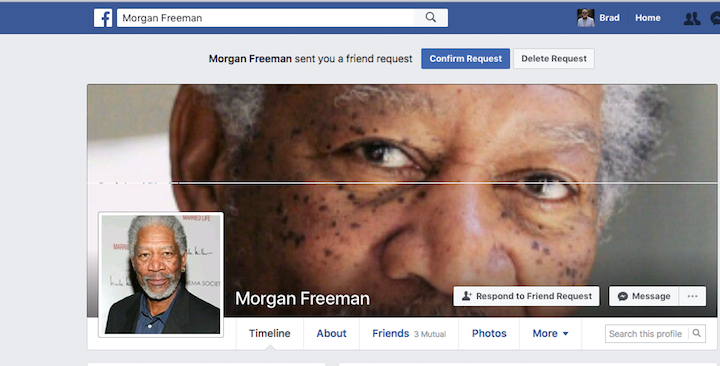By the time you read this, I may have 2,000 Facebook “friends”!
I put the word between quotation marks for a reason you will surely understand: most of these folks aren’t friends at all; they’re not even acquaintances. I never met them at a business lunch or on the train ride down to Manhattan. They’re not people I sat next to on a plane ride or walked passed along the Champs-Élysées. In other words, they’re not the people who have said to me upon parting, “I’ll friend you on Facebook!”
They are merely . . . people – most actually corresponding to their online identities – who, for reasons I rarely know, decided to click the Add Friend button that appears on “my” page. And I put that pronoun between quotes, because it’s Mark Zuckerberg’s page. My name is on it, but it’s no more mine than those (as I write) 1,900 “friends” are really my friends.
Of that large number, I reckon I’ve met less than a quarter of them face to face, and that may be overstating the fact. Yet even among those several hundred souls (neighbors, high-school classmates, work associates, and so on) most are better described as acquaintances. This isn’t a problem per se, since many of these less-than-friends are people I’ve come to like and admire online. As to all those others, perhaps I’ll meet them in heaven.
After I’d reached 1,000 friends, I began to notice that the pace of friend requests began to increase and come from people on other continents, especially Asia and Africa. Now in the course of my work, I’ve met prelates from China, Nigeria, the Philippines, Pakistan, and other countries, and it may be that some of what I’ve written about those meetings has appeared – in English or in translation – in some of those places, but I doubt that’s a sufficient explanation, especially for the many Africans requesting “friendship,” given that so many of them are affiliated with Protestant groups of the Pentecostalist persuasion. A few are “Nigerian princes,” if you know what I mean.
Some of the requests accepted are quickly followed by messages. One Asian woman wrote:
Brad miner can u introduce with me one of ur friend good man gentle an have work an no wife an can talk each other coz i say ur profile u have so many friend i like to ask but i think u always brad help me one a man very religious okay thanks.
As is true of her, many of my newfound friends are Christian, and such requests as hers may be heartfelt and even sincere, but as I responded to her, “I’m afraid I’m not a matchmaker.” She persisted:
No like ur friend looking future partner u try to introduce to me coz im enterested to come an work in U.S but the important i have a good partner to help my VISA i have owned money.okay thanks

Some others are less loquacious. One sequence of messages from one new Pakistani friend – all unanswered by me – went this way, each separated by a three- or four-day gap:
“hi how r u”
“hi”
“hello”
“Helli”
Another far-flung “friend” messaged to ask if I’m Christian. Had he’d looked at my Facebook page? He replied, “No.”
A fair chunk of these new “friends” come via a few profligate “frienders”: guys racing for the “friend” limit, becoming so many Typhoid Marys.
The requests come in now at twenty per day. I joined Facebook because I thought it would help The Catholic Thing – would build our network of Catholic readers. We also set up a Facebook page for the site itself, which now has more than 15,000 “likes” – likes because it’s a “page” not a person. You “friend” people; you “like” pages. One may have only 5,000 “friends;” “likes” are unlimited.
Rather like a cult leader, one may also have followers. I have several hundred of those, so maybe I’ve already crossed the 2,000 threshold. No one knows the rules, because there are none.
Should we be happy that “friend” has become a verb? The online Merriam-Webster Unabridged says it IS: a transitive verb. But it’s not. It’s a transgressive neologism. Will no one ever again use the word “befriend”?
The multiplying effect of social networking often puts TCT’s daily column on the personal pages of more than twice the number of folks who’ve liked us – “friends” of friends of friends – and there are days when the number of links to a daily column that pop up across Facebook is north of 50,000. This is good, right?
Mostly it is. Contrariwise, social media (including Twitter, Instagram, myspace, and a swelling sea of other sites) have a way of actually emphasizing the distance between us. At times one feels like a Titanic passenger, bobbing in the cold dark. I have no idea what the actual data may be, but, empirically, the jetsam of truths floating by on Facebook only slightly outnumbers the flotsam of lies.
One thing is certainly reconfirmed on social media: true friendship involves actual intimacy, which usually means those face-to-face encounters plus time together, although there are rare cases of long-distance, literary intimacy.
Blessed John Henry Newman wrote that “the love of our private friends is the only preparatory exercise for the love of all men,” although he adds that love on the scale of “all men” is impossible, because we “cannot love those about whom we know nothing; except indeed we view them in Christ, as the objects of His Atonement, that is, rather in faith than in love. And love, besides, is a habit, and cannot be attained without actual practice . . .”
One concludes then that Facebook, specifically, and the internet, generally, are not a cure for loneliness.
True friendship is incarnate; it is flesh. All those fabulous, colorful internet ones and zeros are fine, but, really, Facebook is a fanzine.
But, hey, be sure to “friend” me on Facebook!
















